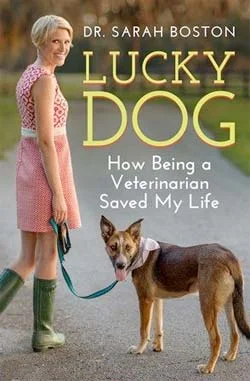UF small animal vet credits pet experience for saving her life
Written by Kristine Crane | The Gainsville Sun.
When Dr. Sarah Boston was doing her nightly ritual of rubbing moisturizing cream on her neck a few years ago, she felt something that was new but all too familiar: a 2-centimeter-sized mass.
As a veterinary surgical oncologist, Boston works with dogs and cats with cancer for a living. That vocation helped her diagnose her own cancer, of the thyroid, well before Boston’s doctors made the diagnosis.
Boston, who works for the University of Florida Small Animal Hospital, wrote about her experience with cancer and how being a vet influenced it in a book titled “Lucky Dog: How Being a Veterinarian Saved My Life,” published by Anansi Press in Canada.
“I kind of just started writing,” Boston said.
Her parents are writers, so although Boston describes herself as a “science geek,” she was raised in an artistic household and writing was an outlet for her.
She started writing about her experience with cancer — mostly in the form of email updates to friends — which gradually began reading like essays.
When Boston had more than 30,000 words, she dubbed her work the “Thyroid Essays.” At a fundraising event for the veterinary cancer center at the University of Guelph in Canada, where Boston worked, she read from her work, and it caught the attention of Noah Richler, a well-known Canadian writer who loved the passage Boston read and put her in touch with the publishing house that would publish her book.
Although initially much of the book was about Boston’s experience with cancer, her editor also wanted stories about her life as a veterinary surgical oncologist. One of the conclusions that Boston reached in comparing the human and canine cancer experience is that animals might oftentimes get better treatment than humans.
“I think vets take a lot more time to explain things (to owners). We’ll spend hours with our clients,” Boston said, adding that vets generally give owners a wide range of options that was missing in her own experience with the health care system in Canada.
“In the human system, they say, ‘This is what we are doing.’ I don’t think options are discussed as much,” Boston added. “I felt like no one was listening to me.”
Dogs, however, are also arguably much easier to treat.
“Dogs are more in the moment, so their stress is more in the moment,” Boston said, explaining that attending to a dog’s nausea, hunger or loneliness can actually make the dog happy and comfortable.
A person, on the other hand, “would still be upset because they can’t stop thinking that they have cancer,” she added.
Surviving cancer made Boston more willing to take risks, she writes, so when a great job came up in Florida, she and her husband, Steve — also a veterinarian (of large animals) — didn’t hesitate to move south.
They live on a farm near Williston with a rescue dog, Rumble, and a 7-year-old cat, Romeow.
“We’re treating it as one big adventure,” Boston said.
Boston’s book is available on Amazon.com. The official release date is June 7.

